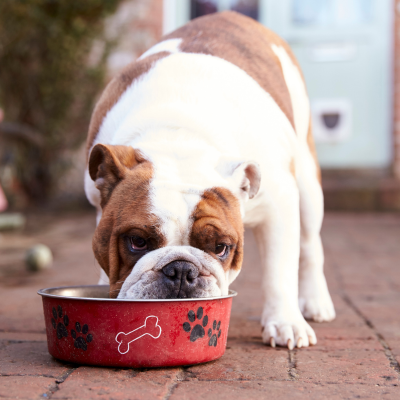Nutrition
Littleton West Animal Hospital offers professional advice on pet nutrition as well as a variety of nutritional pet foods for your dog or cat.
Pet Nutrition and Food Advice for your Dog or Cat
We serve the Denver Metro, Littleton and Highlands Ranch areas of Colorado.
Don’t forget…it’s important to get an annual wellness exam for your dog or cat to help protect their health!

Dog Cookie Recipe:
Beggin’ Veggie Bones:
- 2 1/2 cups flour
- 3/4 cup dry milk powder
- 1/2 cup vegetable oil
- 2 TBSP brown sugar
- 3/4 cup boiling broth (chicken, beef or vegetable) without onion or garlic added
- 1/2 cup shredded carrots
- 1 egg
Preheat oven to 300 degrees. Mix all ingredients into a ball and roll out to 1/4″ thick. Cut with bone shaped cookie cutter, or into strips. Place on ungreased cookie sheet and bake for 30 minutes.
Points to Consider When Choosing Food for Your Pet:
- What is the company’s reputation? How long have they been in business?
- Does the company conduct research on their products and publish their results?
- Are the products tested according to AAFCO feeding protocols?
- Does the company have a Veterinarian on staff and can you call the company with questions about diets and specific medical concerns?
- Will the company supply you with a product guide that includes nutritional analysis?s
- What kind of quality control is performed?
- Is their advertising false or misleading? Does it contain facts, or are they marketing techniques?
For reliable information on pet food and nutrition on the internet, we recommend:
- Pet Nutrition Alliance
- The American Animal Hospital Association (AAHA)
- The World Small Animal Veterinary Association (WSAVA)
Feline Nutrition
Facts provided by Lisa A. Pierson, DVM from catinfo.org.
Cats Need Animal-Based Protein
Cats are obligate (strict) carnivores and they are very different from dogs in their nutritional needs. What does it mean to be an ‘obligate carnivore’? It means that your cat was built to get his/her nutritional needs met by consuming a large amount of animal-based proteins (meat/organs) and derives much less nutritional support from plant-based proteins (grains/vegetables). It means that cats lack specific metabolic (enzymatic) pathways and cannot utilize plant proteins as efficiently as animal proteins.
- The protein in dry food, which is often heavily plant-based, is not equal in quality to the protein in canned food, which is meat-based.
- Cats have no dietary need for carbohydrates, and the fact is that a diet high in carbohydrates can be detrimental to their health, in a healthy cat with no kidney or liver problems
- A cat on dry food consumes approximately half the amount of water compared with a cat eating canned food. Many cats are chronically dehydrated.
- Pet food labels rarely list the carbohydrate amount which is very frustrating because we are trying to stay under 10% carbohydrate calories. If you do not see high carbohydrate ingredients such as grains, potatoes, peas, etc., listed on the label, it is a safe bet that the food is low in carbohydrates.
- The caloric needs of an average cat can range between 150 – 250 calories/day depending on their lean body weight and activity level. Dry food typically has 350-500 calories per cup and 25-35% carbohydrates.
- To get specific nutritional information when calling a pet food company, ask for the “Typical Nutrient Analysis.”
- To calculate an estimated percentage of carbohydrates in a specific canned food: 100- (sum of all % of ingredients reported) divide that by dry matter which is (100-moisture %) and multiply by 100.
- Additional information and a cat food comparison chart is provided on the Cat Info website.
It is important to communicate diet changes and trials with your Veterinarian in order to make sure it is safe and balanced for the needs of your individual cat.
